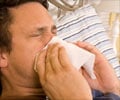Highlights
- Hay fever or seasonal allergic rhinitis is mainly caused by grass pollen.
- Patients exposed to an increased amount of grass pollen could be effective in reducing the symptoms of hay fever.
- Scientists from Imperial College London found a three-year course of treatment to be more effective in reducing the symptoms of hay fever with long-lasting benefits.
Previous studies have found that patients exposed to an increased amount of grass pollen could be an effective way to reduce symptoms in the long term.
However, a recent study published in the journal JAMA has found that the two-year course of treatment may not be effective in achieving last effects. This further provides strength on previous studies that more time is required for taking the medication to have lasting benefit.
Professor Stephen Durham, Head of Allergy and Clinical Immunology at the National Heart and Lung Institute at Imperial, said, "You treat patients for three years and then they have a big improvement in their hay fever for several years afterwards."
"Exposing people to grass pollen in this way is a very effective treatment for people who really have debilitating hay fever."
Exposing the immune system to grass pollen extracts over time build up resistance, either through injections or pills containing pollen extract.
The research study involved testing the efficacy of two immunotherapies which contains grass pollen extract prescribed by the National Health Services. The grass pollen extract is taken in the form of injection or a pill under the tongue.
The trial was able to find out whether the two-year treatment had long-lasting benefits to the patients as the three-year immunotherapy. This could potentially cut clinical cost savings.
The research study was conducted on 106 patients were randomized to one of three treatment groups that include injection, tablets and placebo.
These patients who had moderate to severe hay fever were either administered daily oral or weekly injections for 15 weeks which was followed by monthly boosters or placebo. Around 92 patients completed the study.
After two years, the results reported both the treatments to be effective in tackling the symptoms. However, the effects were not better than the placebo after one year of patients had to stop taking the medication.
Professor Durham, said, "Hay fever causes major impairment of sleep, work and school performance and leisure activities during what for most of us is the best time of the year."
"Most people respond to the usual antihistamines and nasal sprays, although there is a portion who do not respond adequately or who have unacceptable side effects to the treatment."
Professor Durham, said, "This study shows that whereas both immunotherapy treatments were highly effective, two years of treatment was insufficient for long-term benefits."
"Clinicians and patients should continue to follow international guidelines that recommend a minimum of three years' treatment."
The long-lasting benefits of both immunotherapy injections and pills for severe hay fever - benefits which persist for at least two to three years after the treatment has stopped.
The author finally concludes that inorder to get long-term clinical benefits of the treatment it has to be taken for three years.
Source-Medindia














